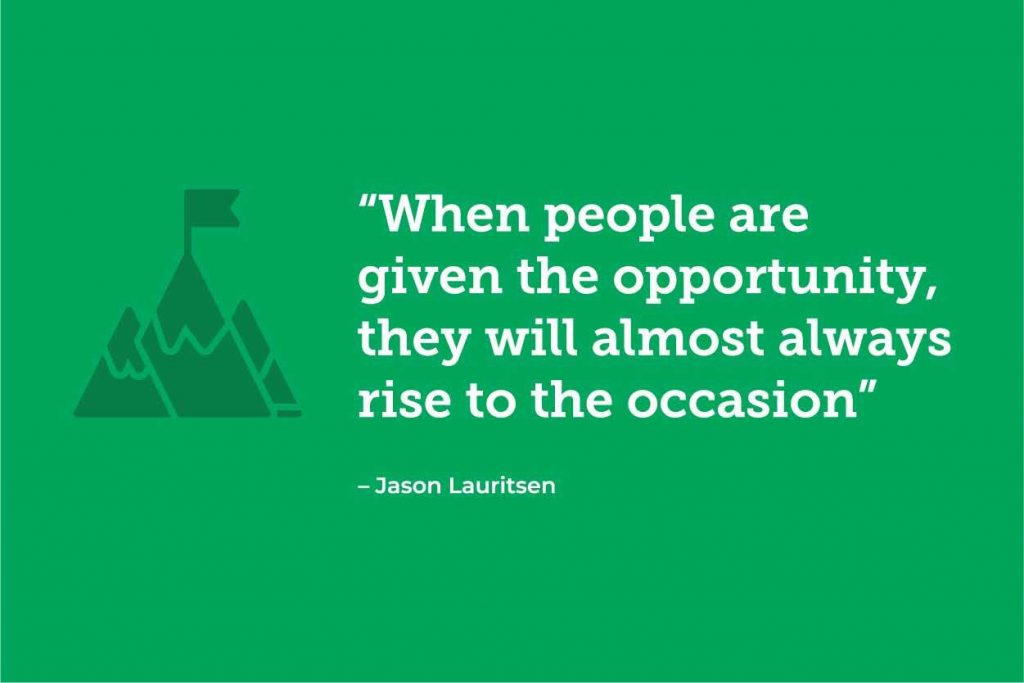Managing remote teams: A Q&A with Jason Lauritsen and Linda Jonas
While there is nothing new about working remotely, the scale at which it has been adopted over the last twelve months has been staggering. An option that only a small section of the workforce were able to benefit from became a life raft for many organizations. Necessity forced its implementation, but the results spoke for themselves. So even as we slowly begin to transition back into society, remote work isn’t disappearing.
But how do we make sure that we’re managing remote teams effectively? Especially when best practices are so sparse. SocialTalent have just released a comprehensive set of missions on our learning platform to equip managers with the skills and knowledge needed to lead with confidence and success, even from afar. Delivered by the incomparable Jason Lauritsen and Linda Jonas, who bring with them years of experience and insight, this content is game-changing.
We were lucky enough to snag them both for a quick Q&A to give us EVEN more guidance and tips on managing remote teams. Check it out.

Q. One of the fundamental aspects of successfully managing remote teams is adopting the right mindset. Jason, you mention the difference between cultivation and production mindset – can you elaborate on this?
The production mindset
This is the predominant mindset of modern management today. It’s one we inherited from the early days of management that treats work as a contract to be enforced with the employee. Production mindset leads managers to think of their job as ensuring that employees simply do the work and put in their time. It’s focused on control and largely treats employees as a means of production (i.e. “Just do your job, that’s what we pay you for.”).
The production mindset was appropriate 100 years ago, when work was done on production lines, but it’s a broken approach to management today. It assumes that people need to be coerced or motivated into performance. And, it largely runs counter to what employees need to be most engaged and productive in their work.
The cultivation mindset
The cultivation mindset, on the other hand, is inspired by the approach that farmers and gardeners take to fostering the growth of their plants. The farmer knows that each seed she puts in the ground is genetically coded for growth and performance. As long as that seed has what it needs and doesn’t encounter any major obstacles that stunt its growth, it will manifest into the best version of itself. Growth and performance are the default setting for these plants. The farmer understands this and knows that her job is to create an environment that provides for the needs of the plants and removes obstacles wherever possible. The plant will do the rest. In farming this work is often called cultivation.
Humans, like all other living things, are genetically coded for growth and performance. When we come to embrace this reality, the job of management starts to look a lot more like the job of the farmer – to ensure that people have what they need and are free of obstacles. When people are given the opportunity, they will almost always rise to the occasion. If they don’t, it’s not that they are broken. It’s almost always a failure of management. This is an example of how the cultivation mindset is very different from the production mindset. Cultivation is the approach and mindset we need to successfully manage in today’s world of remote, hybrid or otherwise.
Q. Humanity and wellness tie into this discussion on mindset so closely. How responsible are managers for the well-being of their teams? And has this become of greater importance since the onset of COVID?
Well-being has always been a vital element of performance and engagement at work. But until COVID arrived, it wasn’t something that got the attention it deserved. On a personal level, we have all experienced the effect that being unwell has on our performance at work. When we are sick, it’s hard to focus or get much done. When we are having relationship issues, it is a constant distraction. If a family member is ill or suffering, your time and energy is spent worrying about that instead of on the task at hand.
When our well-being is suffering and we don’t feel strong and energized, there’s just no way we can perform at our best. It’s a performance capacity issue. If I am unwell, I only have a fraction of my potential to even offer up when I show up to work. As a manager, if you want to maximize the potential of your team, you have to be fully invested in the well-being of each individual on your team. There’s no way around it. And while COVID has brought well-being to the forefront, that’s where it should have been all along.

Q. Linda, you’ve been working remotely for over ten years now and you mentioned on the Shortlist all the pitfalls you had to overcome initially. What are the most common roadblocks you see with managers and remote teams?
Working with remote teams allows ample opportunities to miss cues, misread communication and leave wrong assumptions uncorrected for too long. Here are 3 things that I learned the hard way and that I see other managers trip up on also:
Not addressing the elephant in the room. It might be easy to avoid during a one hour team call but they will remain on the mind of the team for many hours more. Those elephants can lead to disengagement and ultimately turn into nightmares, so always tackle them early!
Picking the wrong communication channel. For instance, when giving feedback, don’t take the most convenient way for you. Choose the most effective channel. Time zone issues might make a call harder but it doesn’t justify a feedback email. That just causes more issues than it saves time. Always schedule a video call for feedback.
Not creating enough clarity around expectations. Be explicit about what is expected in terms of results and behaviours and get the team to repeat back what they understood. Too often we assume something should be obvious or clear, but when working remotely, this isn’t always the case.
Q. Striking a balance seems to be important for managers of virtual teams, especially when it comes to communication. Would you agree with this?
Striking a balance is an interesting way to think about it. The challenging part of finding that balance, particularly when it comes to communicating with remote teams, is that you have to find the balance for each employee. And it will vary within a team. Every person has different preferences and needs when it comes to communication.
The key to effective communication is to understand that the measure of success is whether the person on the other end of the communication has received and understood the message as intended. This means that employees have to play an active role in shaping and guiding the type and style of communication used. Regular and ongoing feedback is vital.
It’s also incredibly important as a manager to create shared accountability with each team member for clear and effective communication. It is impossible to sustain great communication within your team without their partnership and participation. This is something we get into in detail in our course on effective communication.
Q. The pandemic has lit a spark under the possibilities of remote work. But a lot of work has to be done to hone the skills needed to manage in this arena effectively. How does your content on the SocialTalent platform set people up for success?
It’s a comprehensive training program. It has everything a manager needs to, not only manage their remote team more effectively, but to really elevate the performance of their team by adopting a more human-friendly approach, built on a foundation of the cultivation mindset. It’s got the what, why and how covered. So you can take the concepts and put them into immediate action as soon as you finish a course.
